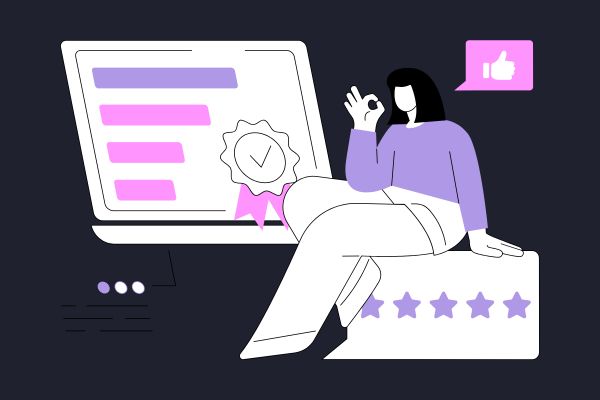Last Updated on May 22, 2025 by Becky Halls
If you’ve ever muttered “Maybe I should just buy backlinks for my website…” while watching your organic traffic flatline, you’re not alone. It’s the SEO equivalent of googling “how to get rich quick” after checking your bank balance post-Christmas.
Buying backlinks is one of the most debated topics in SEO – and for good reason. Done well (and ethically), it can be part of a broader link-building strategy. Done poorly, and it’s a one-way ticket to a Google penalty.
So, should you buy backlinks for your website? If so, how do you do it safely? What are the risks? What’s a fair price? And is there a better alternative?
Let’s unpack the good, the bad, and the spammy.
What Does It Mean to Buy Backlinks for My Website?
Buying backlinks simply means paying a fee – whether to a site owner, a marketplace, or an agency – in exchange for them placing a link to your website.
There are many forms:
-
Sponsored guest posts
-
Link insertions (aka “niche edits”)
-
Directory placements
-
Backlink packages from providers or platforms
But not all purchased backlinks are created equal. There’s a huge difference between:
-
Paying for a relevant, contextual link in a high-authority blog post
vs. -
Dropping $9.99 on 1,000 links from sites last updated during the MySpace era
Should I Buy Backlinks for My Website?
Let’s answer the big question first:
Yes – but only if you know what you’re doing.
Buying backlinks for your website can work when:
-
The links are editorial (added naturally into real content)
-
The site has good authority and organic traffic
-
The placement is relevant to your niche
-
It’s disclosed as sponsored (or nofollow, when appropriate)
-
It’s one part of a diversified strategy
It goes wrong when:
-
You buy bulk backlinks with no quality control
-
You use shady marketplaces or black hat forums
-
You build only paid links (and no earned ones)
-
Your anchor text is over-optimized (“Buy Best Red Shoes Cheap Now!”)
Google’s stance? Technically, buying loads of links is against its guidelines. But sponsored content, advertorials, and editorial partnerships are acceptable if disclosed and marked appropriately.
How to Buy Backlinks for My Website Safely
If you’re going to do it, here’s how to do it the right way:
1. Vet the Site
Before buying a backlink:
-
Check the site’s domain rating (DR) or domain authority (DA)
-
Read their recent content – does it look like a real blog, or AI soup?
-
Check how many outbound links are on the page (too many = spammy)
If it feels low quality, it probably is.
2. Ask for Transparency
A good backlink seller or agency should:
-
Show you real domain examples
-
Share metrics (traffic, DR, audience relevance)
-
Explain how the link will be placed (in a guest post? as an edit?)
-
Offer content creation that isn’t churned out by a bot on Red Bull
3. Watch the Anchor Text
Avoid the temptation to stuff your anchor with keywords. Natural is best.
✅ Good:
“Check out this post on content optimization tips.”
❌ Bad:
“Buy backlinks for my website cheap best link service 2025 UK!”
Too many exact-match anchors are a red flag for Google.
4. Track Your Links
Once you’ve bought a backlink:
-
Monitor if it stays live
-
Track referral traffic
-
Check if it indexes in Google
-
Use a tool like 3way.social to manage your backlink portfolio and monitor value over time
5. Diversify Your Backlink Sources
Paid backlinks should be the icing, not the cake.
Also build:
-
Free links (guest posts, link exchanges, broken link building)
-
Organic links (earned via great content)
-
Directory and citation links (especially for local SEO)
You want a natural-looking link profile, not a pattern that screams “bought in bulk.”
What About AI-Generated Link Sellers?
In 2025, some platforms offer “AI-generated link building” – sounds fancy, but be cautious. Often, it just means:
-
Mass-generated outreach
-
Low-quality, templated content
-
Dodgy placement on thin affiliate sites
Unless the AI tool is helping you find quality domains (like 3way.social does), it’s usually just a shiny wrapper on spam.
What to Avoid When Buying Backlinks
-
Fiverr or gig-style bulk backlinks
-
PBNs (Private Blog Networks)
-
Sites that only exist to sell links
-
Pages with 100+ outbound links
-
Suspicious sellers who don’t use real names or businesses
-
Anyone who guarantees “#1 rankings fast”
Alternative: Link Exchanges That Don’t Break Rules
Buying backlinks for your website isn’t the only option. Platforms like 3way.social offer ethical, Google-safe link exchanges.
-
Use AI suggestions to find link partners
-
Run ABC-style exchanges (no direct reciprocation)
-
Track link performance and anchor text
-
Keep everything transparent and above board
No shady deals. Just smart link-building collaboration between like-minded site owners.
Final Thought: Buying Links Can Work, But It’s Not a Shortcut
When you buy backlinks for your website, you’re entering the grey zone of SEO. But done properly, with the right vetting, relevance, and moderation, it can be a legit strategy.
Just don’t rely on it alone. Keep your backlink profile diverse, build great content, and use tools like 3way.social to stay strategic.
It’s not about hacking Google; it’s about earning trust, building authority, and playing the long game smarter.
FAQ: Buy Backlinks for My Website
Is it safe to buy backlinks for my website?
Yes, if done carefully. Buy from reputable sources, ensure link quality, and don’t rely on paid links alone.
Where can I buy high-quality backlinks?
Look for vetted backlink agencies, niche bloggers, or sponsored post platforms. Avoid cheap gigs and low-quality marketplaces.
How much should I pay for a backlink?
Expect to pay £75–£500 per link depending on the site’s authority, traffic, and content quality.
Will Google penalise me for buying backlinks?
If the links are clearly manipulative or low quality, yes. Use natural placements and proper disclosure when needed.
Is there an alternative to buying backlinks?
Yes—use platforms like 3way.social to exchange backlinks ethically, or earn them through guest blogging and valuable content.






